In healthcare, LLMs are applied in various ways, such as analyzing medical records, generating patient summaries, and assisting with research. They can process unstructured data like clinical notes and extract relevant details, helping healthcare professionals make informed decisions. For instance, an LLM could summarize a patient’s history and present it in an easily digestible format for doctors.
LLMs also play a role in patient interaction. Chatbots powered by LLMs can answer basic medical queries, schedule appointments, or provide follow-up care instructions. These applications help reduce the workload on healthcare staff and improve patient engagement.
In research, LLMs assist by summarizing scientific papers or identifying trends in large datasets. For example, they can analyze studies on a specific drug’s effectiveness and generate insights for researchers. While LLMs are not a replacement for medical expertise, they serve as valuable tools to enhance efficiency and support decision-making in healthcare environments.
